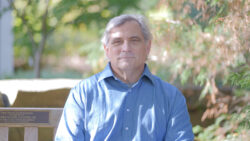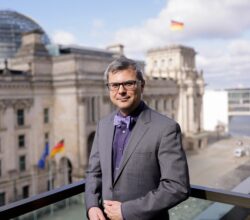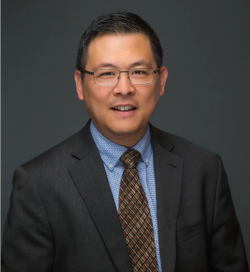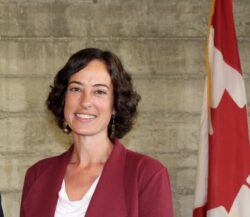U.S.-Canada Relations Transformed: Border, Security, and Trade in a New Era
April 1st, 2025 5:30PM -7:20PM
*Please note the venue floor for this program has changed to the 33rd floor*
The relationship between the United States and Canada has long been defined by deep economic ties, shared security interests, strong personal connections, common values, and the world’s longest undefended land border. In just a few short weeks since the inauguration of Donald Trump, these long-standing relations have been put to the test, challenging trade, border policies, and security cooperation.
Is North America at a crossroads? What are the new realities of U.S.-Canada relations?
Join us for a panel discussion as we explore the future of trade, borders, and security between these two key allies.
About Our Speakers
 Dr. Todd Hataley is a professor in the School of Health and Community Services at Fleming College, and a criminal intelligence analyst with the Ontario Provincial Police. He is a retired member of the Royal Canadian Mounted Police. During his tenure as a federal police officer, he worked as an investigator in organized crime, national security, border integrity and sensitive and international investigations. Dr. Hataley is an adjunct associate professor at the Royal Military College of Canada and in the Australian Graduate School of Policing and Security at Charles Sturt University in Canberra, Australia. His research currently focuses on the management of international boundaries, money laundering, Indigenous policing and transnational crime. Dr. Hataley is the co-author of North American Regional Security: A Trilateral Framework (2013), and the co-editor of Patterns in Border Security: Regional Comparisons (2023) and Security. Cooperation. Governance. The Canada-United States Open Border Paradox (2023).
Dr. Todd Hataley is a professor in the School of Health and Community Services at Fleming College, and a criminal intelligence analyst with the Ontario Provincial Police. He is a retired member of the Royal Canadian Mounted Police. During his tenure as a federal police officer, he worked as an investigator in organized crime, national security, border integrity and sensitive and international investigations. Dr. Hataley is an adjunct associate professor at the Royal Military College of Canada and in the Australian Graduate School of Policing and Security at Charles Sturt University in Canberra, Australia. His research currently focuses on the management of international boundaries, money laundering, Indigenous policing and transnational crime. Dr. Hataley is the co-author of North American Regional Security: A Trilateral Framework (2013), and the co-editor of Patterns in Border Security: Regional Comparisons (2023) and Security. Cooperation. Governance. The Canada-United States Open Border Paradox (2023).
 Dr. Christian Leuprecht (PhD, Queen’s) is distinguished professor, Department of Political Science and Economics, Royal Military College, director of the Institute of Intergovernmental Relations, School of Policy Studies, Queen’s University, editor-in-chief of the Canadian Military Journal and adjunct research professor, Australian Graduate School of Policing and Security, Charles Sturt University. He has held visiting positions in North America, Europe, and Australia, including as Fulbright Research Chair in Canada-US Relations at the School for Advanced International Studies at Johns Hopkins University in Washington, DC, Eisenhower Fellow at the NATO Defence College in Rome, Matthew Flinders Fellow at Flinders University of South Australia, and Bicentennial Visiting Professor at Yale University.
Dr. Christian Leuprecht (PhD, Queen’s) is distinguished professor, Department of Political Science and Economics, Royal Military College, director of the Institute of Intergovernmental Relations, School of Policy Studies, Queen’s University, editor-in-chief of the Canadian Military Journal and adjunct research professor, Australian Graduate School of Policing and Security, Charles Sturt University. He has held visiting positions in North America, Europe, and Australia, including as Fulbright Research Chair in Canada-US Relations at the School for Advanced International Studies at Johns Hopkins University in Washington, DC, Eisenhower Fellow at the NATO Defence College in Rome, Matthew Flinders Fellow at Flinders University of South Australia, and Bicentennial Visiting Professor at Yale University.
A recipient of RMC’s Cowan Prize for Excellence in Research and an elected member of the College of New Scholars of the Royal Society of Canada, he is a senior fellow at the Macdonald-Laurier Institute and the Centre for North American Prosperity and Security. He is regularly called as an expert witness to testify before committees of Parliament.
His publications have appeared in English, German, French, and Spanish and include 20 books and over five dozen scholarly articles. His editorials appear regularly across Canada’s national newspapers, and he is a frequent commentator in domestic and international media.
 Matt Morrison serves as CEO of the Pacific NorthWest Economic Region (PNWER) which was established in 1991 by statute in the states of Alaska, Washington, Idaho, Montana, and Oregon, and the western Canadian provinces of British Columbia, Alberta, Saskatchewan, the Yukon, and Northwest Territory. Mr. Morrison also manages PNWER’s Center for Regional Disaster Resilience (CRDR).
Matt Morrison serves as CEO of the Pacific NorthWest Economic Region (PNWER) which was established in 1991 by statute in the states of Alaska, Washington, Idaho, Montana, and Oregon, and the western Canadian provinces of British Columbia, Alberta, Saskatchewan, the Yukon, and Northwest Territory. Mr. Morrison also manages PNWER’s Center for Regional Disaster Resilience (CRDR).
As CEO of PNWER, Mr. Morrison’s responsibilities include coordinating all PNWER projects and reporting to the governing board, which consists of legislative leadership of each state, province, and territory, governors and premiers, and private sector leaders. The mandate of PNWER is to build the region's economy while enhancing the region’s natural environment. PNWER’s 15 working groups focus on trade and border issues, economic development, agriculture, energy and environment, invasive species, tourism, transportation, and workforce, among several others.
Mr. Morrison is a leader in promoting innovation in the Canada-U.S. border region and has been instrumental in several successful pilots of the Beyond the Border and Perimeter Security Action Plan. PNWER has encouraged both Ottawa and Washington, D.C. to consider the region a ‘cross-border pilot zone’ because of the network of trusted relationships built by the ongoing working groups that PNWER facilitates. Mr. Morrison has been engaged in building economic resilience over the past decade by hosting a series of critical infrastructure interdependency exercises focused on the regional economy and, through the Center for Regional Disaster Resilience, addressing public and private gaps and vulnerabilities to mitigate risks from all hazards to the regional economy. The CRDR also runs the Northwest Warning, Alert, and Response Network (NWWARN) and has conducted annual cybersecurity exercises in Washington State and Idaho for the past several years, focusing on cyber resilience and training. In addition, Mr. Morrison has been instrumental in coordinating with the Canadian government on infrastructure and port security and preparedness issues related to the Pacific Northwest, including joint exercises leading up to the 2010 Winter Olympics.
Along with his role at PNWER, Mr. Morrison is Co-Chair of the Future Borders Coalition, a group of public and private organizations bringing solutions to border issues in all modes at the Canada – U.S. border. The FBC is currently working on COVID resilience and solutions to safely easing border restrictions based on science and health standards.
Mr. Morrison lives in Seattle with his wife, Beth. He and Beth have four adult children with whom they enjoy skiing, sailing, and hiking.
 Solomon Wong is President and CEO of InterVISTAS, a global consulting firm with services in market analyses, policy development, planning, and strategies related to the movement of people and goods.
Solomon Wong is President and CEO of InterVISTAS, a global consulting firm with services in market analyses, policy development, planning, and strategies related to the movement of people and goods.
He has a track record on regulatory and technological change and has helped to implement solutions for a range of private/public sector clients. In the late 1990s, Solomon assisted in the business cases for trusted traveler programs. In the 2000s, he developed the business case and analyses for simplification of processes, including elimination of aviation security re-screening and border kiosk automation. In the 2010s, his achievements included developing models to eliminate baggage recheck and other initiatives to reduce minimum connect time (MCTs) at hub airports. Results of his work have informed planning of new facilities throughout the US and Canada.
Solomon is active on Future Borders Coalition, to help the strategy in North America for border improvements across aviation, maritime and surface modes of transportation. He is a former board member on the Airports Consultants Council and has spoken regularly at industry events on the evolution of transportation and strategic planning. He is very passionate about sustainability and has demonstrated this by contributing to Airports Council International (ACI) World’s efforts on countering illegal trafficking of wildlife. Equality, diversity, and inclusion are also priorities of his, and through his leadership has advanced EDI within InterVISTAS.
He is an urban planner by training and wrote his Master’s thesis on noise exposure around airports. Outside his professional life, he is enjoying seeing the world through his two boys and planning future family travels as pandemic measures start to subside.
About Our Moderator
 Dr. Laurie Trautman is the Director of the Border Policy Research Institute at Western Washington University. Dr. Trautman engages in a range of research activities focused on the U.S. – Canada border, particularly in the Washington – British Columbia region. Topics include trade, transportation, security, and human mobility. In addition to working with faculty and students, she collaborates with the private sector and government agencies to advance policy solutions that balance cross-border flows with the need for efficiency and security. Laurie participates in working groups that are actively engaged in the U.S. – Canada relationship, including the International Mobility and Trade Corridor Program and the Canada – U.S. Transportation Border Working Group. She co-chairs the Border Issues working group of the Pacific Northwest Economic Region and was recently appointed to the steering committee for the Cascadia Innovation Corridor. Laurie is currently a Global Fellow with the Woodrow Wilson Center and a Fellow with the Canadian Global Affairs Institute.
Dr. Laurie Trautman is the Director of the Border Policy Research Institute at Western Washington University. Dr. Trautman engages in a range of research activities focused on the U.S. – Canada border, particularly in the Washington – British Columbia region. Topics include trade, transportation, security, and human mobility. In addition to working with faculty and students, she collaborates with the private sector and government agencies to advance policy solutions that balance cross-border flows with the need for efficiency and security. Laurie participates in working groups that are actively engaged in the U.S. – Canada relationship, including the International Mobility and Trade Corridor Program and the Canada – U.S. Transportation Border Working Group. She co-chairs the Border Issues working group of the Pacific Northwest Economic Region and was recently appointed to the steering committee for the Cascadia Innovation Corridor. Laurie is currently a Global Fellow with the Woodrow Wilson Center and a Fellow with the Canadian Global Affairs Institute.
She holds a PhD in Geography from the University of Oregon, a MSc. from Montana State University, and a BA from Western Washington University in Environmental Economics.
Amazon is an underwriting sponsor of all World Affairs Council Community Programs.